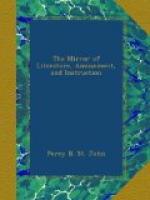as auditor to Henry, Duke of Norfolk, he was, through
that connexion, introduced into Derbyshire, and spent
the latter part of his life, which was devoted to music
and mathematics, at Wingfield. In the Appendix
to Foster’s
Mathematical Miscellanies
are some of his pieces. In the year 1676 he observed
an eclipse of the sun at Wingfield, which was published
in the
Philosophical Transactions for that
year. The Manor was, in 1817, in the possession
of Wingfield Halton, Esq., great grandson of the aforesaid
Emanuel; but it was not then inhabited. The last
of the Halton family who resided at the Manor-House
became its spoiler; for, desiring to build himself
a house at the foot of the high hill upon which the
mansion stands, he pulled down and unroofed part of
the fine old structure—so that the hall,
with its proud emblazonry of the Shrewsbury arms and
quarterings, became exposed to the decaying influences
of the elements.[3] The mansion had been, however,
previously much injured during the civil wars, in the
reign of Charles I.; and there are a few singular
incidents in its fate. The house being possessed
by the royal party, was besieged and taken by Lord
Grey, of Groby, and Sir John Gall, of Hopton—brave
officers in the service of the parliament, who, according
to Whitelock, voted them a letter of thanks for this
and other services. The assault was begun on
the east side, with cannon planted on Pentridge Common,
and a half-moon battery raised for its defence in
this quarter was soon carried; but a breach being
found impracticable, the cannon were removed to a
wood on the opposite side. They soon opened a
considerable breach in the wall, and captured the place.
Colonel Dalby, who was the governor, was killed during
the siege. He had disguised himself in the dress
of a common soldier, but being seen and known by a
deserter, he was shot by him in the face as he walked
in one of the stables. The hole through which
the assailant introduced his murderous musket might
lately be seen, near the porter’s lodge.
[3] The strange taste, or
rather Vandalism, which despoiled
the
Manor House, had well nigh led the Halton family to
consider
the valuable MSS. and correspondence of their
philosophical
ancestor as so much waste paper.
* * * *
*
POSTS FOR THE CONVEYANCE OF LETTERS.
Posts of some kind or other appear to have been in
extensive use, and to have been held in high importance,
by all civilized nations, from an early period of
history to the times we live in. Attempts were
at first made to carry on correspondence by the means
of pigeons and other birds, and though the attempt
did not altogether fail, yet it was never carried
into extensive practice, and in the progress of time
was totally disused. The first establishment of
Posts can be traced to the times of the ancient Persians.




